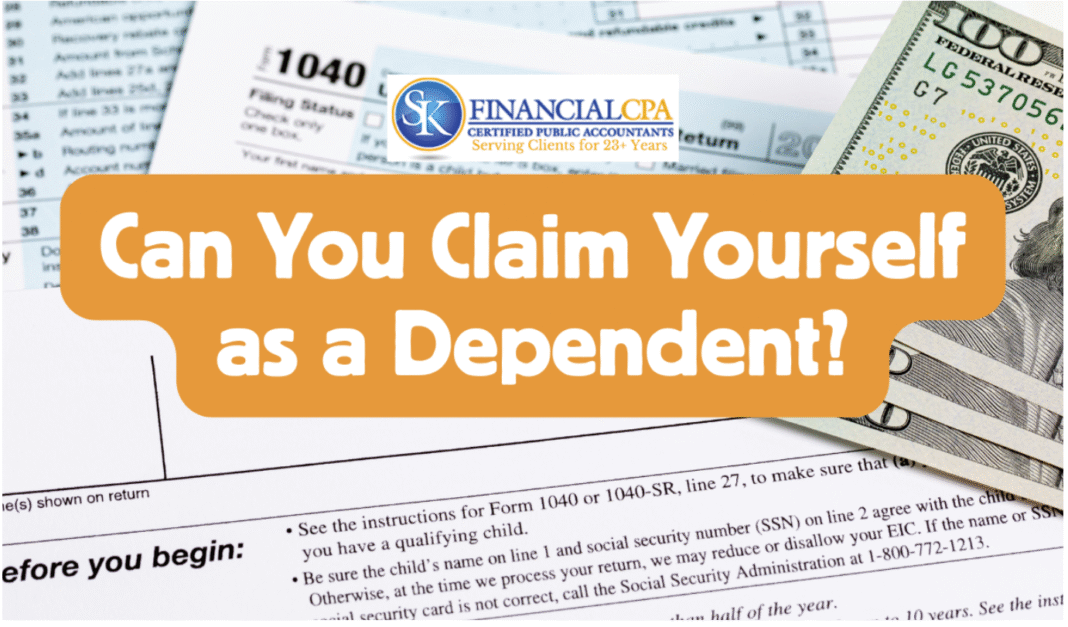Tax season is a fast and complicated time of the year for taxpayers. In addition to that, thinking about who qualifies as a dependent and if you can claim yourself as a dependent on your tax return is difficult to understand. The majority of taxpayers assume that they can claim themselves as a dependent. But as per the rules and regulations stated by the IRS about dependency, the opposite is true. In this blog, we are going to discuss Can You Claim Yourself as a Dependent? requirements, tax benefits, and other deductions that relate to taxpayers who file on their own.
What It Means to Be a Dependent
A dependent is someone whom another taxpayer supports financially—typically a child or a relative. The IRS recognizes two main categories of dependents: qualifying children and qualifying relatives. Each category has its own set of specific requirements that must be met for a taxpayer to claim the individual as a dependent on their tax return. According to IRS rules, individuals cannot claim themselves as dependents.
Can You Claim Yourself as a Dependent?
The simple answer to this question is no. As per the rules stated by the IRS, individuals are not allowed to claim themselves as a dependent. The reason for this limitation is that every taxpayer is already benefiting from the standard deduction when filing their tax return. And that reduces your taxable income. On the other hand, dependents don’t receive the standard deduction but receive exemptions or tax credits that their claimants receive.
Standard Deduction and Its Role in Your Taxes
The standard deduction is an amount that reduces taxable income and is based on filing status. Before 2018, tax filers could reduce their taxable income by claiming a personal exemption, just like claiming a dependent. But the Tax Cuts and Jobs Act of 2017 eliminated personal exemptions and replaced them with standard deductions. This change simplified tax filing and ensured that everyone receives an automatic reduction in taxable income without claiming themselves as a dependent. The standard deduction amounts for 2024 are: single filers, $15,000; married filing jointly, $30,000; and head of household, $22,500.
Who Qualifies as a Dependent?
To qualify an individual as a dependent, they must fulfill requirements stated by the IRS. A dependent, as per the rule, can be a child or a qualifying relative. To qualify, the individual must meet at least one of the following requirements:
Be permanently disabled, regardless of age, and require a significant level of financial support from the filer.Furthermore, you can’t claim yourself as dependent if you are filling your tax return.
Be under the age of 19, or be a full-time student under the age of 24 who relies on a parent for financial support.
Have a qualifying relationship to the tax filer, such as being their child, parent, sibling, or grandparent.
Rely on the tax filer due to low income or disability. For example, a relative earning less than $5,200 in gross income for the year 2025 may qualify.
Impact of Being Claimed as a Dependent
If someone else claims you as a dependent on their tax return, then you will not be eligible for the standard deduction on your own tax return. However, additionally, you will be eligible for the deduction for earned income but on the other hand, you will not qualify for certain credits, such as the earned income tax credit (EITC) or the education credits like the American Opportunity Tax Credit, as these credits go to the one whom you claim as a dependent.
Tax Credits and Deductions for Claiming Dependents
Although you cannot claim yourself as a dependent, you can still take many tax benefits upon filing your return. The first on the list is the Earned Income Tax Credit (EITC), which provides assistance to low-to-moderate income earners if they meet the specific requirements. Next is the for students loan If you’re still paying student loans, you can deduct up to $2,500 in interest paid. Moreover, education credits like the American Opportunity Tax Credit (AOTC) and Lifetime Learning Credit (LLC) grant relief from taxes for expenses of higher education. For elderly retirement contribution accounts like 401(k)s, the IRS can lower the taxable income. For healthcare credits available like health saving account contributions You can contribute pre-tax dollars to an HSA if you have a high-deductible medical plan and reduce your taxable income.
Conclusion
Although claiming yourself as a dependent is not an option as per the rules of taxation, as the IRS already offers individual taxpayers a standard deduction. Understanding the claiming dependency rules and requirements will help you decide if you can claim someone as a dependent and what sort of benefit that dependent will be able to get as well as what benefits you will be able to claim while filing your tax return. can claim you and what tax benefits you can still qualify for.
By using those tax credits and deductions, you can lower your taxable income and receive a larger tax refund. If you are still not sure how this will be applicable to your tax situation, seek assistance from a certificated and trusted CPA. A tax professional will assist you in understanding your unique tax situation, and you will be able to get the maximum benefit of all the available credits and deductions, which will result in a good refund that is always the end goal of taxpayers. For further questions and queries, contact SK Financial CPA, a trusted CPA offering various services from tax preparation to tax planning.
Read about: Experience the Joy of a Scenic and Memorable Buggy Ride







